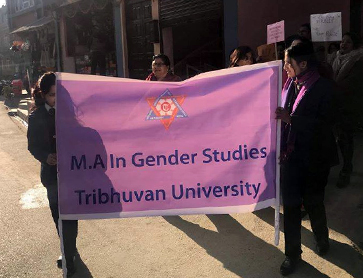Tribhuvan universuty
Department of
Gender Studies
Masters in Gender Studies was established in July 2009 upscaling the Post Graduate Diploma in Women’s Studies that was running as a one-year degree program since September 1996.It is under the auspice of the Faculty of Humanities and Social Sciences at Tribhuvan University.
Gender Studies focuses on complex interplay of gender with other social, political, cultural, and economic identity markers to answer important questions that exist in politics, society, and economics. Gender Studies emerged in response to those unsolved, partial answers to social problems that were brought forward by various disciplines. Since it incorporates issues and questions from various disciplines that pertain to gender, the program is intensely interdisciplinary.

Women’s Studies as an academic program is gradually gaining a foothold in Nepali academia. In 2009, Gender Studies was introduced as a formal two-year Master’s program for the first time in the country.
Gender discourse in academia started long before Women’s Studies was introduced in Nepal in 1996.There is a link between the emergence of feminist consciousness among some Nepali women and the institutionalizing of gender discourse in academia. Before 1950, feminist consciousness was largely limited to individual levels. Therefore, individual women like YogmayaNeupana, Yogmaya Koirala and Chandra Kanta advocated for women’s right to education. During the later phase of the Rana regime, however, women started to raise voices collectively against discrimination.
Nepal Mahila Sangh (1947) led by Mangala Devi Singh, and Adarsha Mahila Samiti (1949) led by Rebanta Kumari Acharya were among the organizations which advocated for women’s access to education. Since the introduction of democracy in 1950, women’s education has remained the key issue in Nepal’s feminist movement.
From advocating for formal schooling for all women to reducing the gender gap in education, feminists’ struggles to achieve gender equality in Nepal’s education systems continue.
Gender Studies has over the last 20 years raised a palpable feminist consciousness and allowed us to develop a nuanced perspective on gender. In a way, the major objective of the program to produce graduates with perspectives on both gender and feminism – ie. the ability to put women at the center of questions about social structures, and the ability to analyze the relationships between men and women is continuously being achieved.
Objectives
Career Prospects
The Master in Gender Studies program trains students in the understanding of current gender issues and exposes them to a comprehensive range of tools and methods for the analysis of real-world social and development issues and its relation to gender.
Graduates can follow careers as gender specialists and analysts in a wide variety of development agencies, both in the government and elsewhere.
Vision
Mission
Goal
Existing
Infrastructure
Currently classes are conducted in a rented building in Kathmandu City. It is envisaged that very soon Tribhuvan University is going to allot a block of land in its central campus location. Funds are to be sought for construction of the building and application for the funding will be made to the University Grants Commission via the Tribhuvan University administration. Additionally proposals will be made to donor agencies for supplementary funding for infrastructural development.
A well established internet service is provided to the students for their academic and research purposes. A small library is established in the current building. However, students are allowed to use a well established library located in the Documentation and Resource Centre in Women’s Studies Program, about ten minutes walk from the current building.
Teaching Faculty
As Gender Studies is a multidisciplinary subject apart from faculties with degrees in Gender Studies, there are faculties from other disciplines such as Home Science, Economics, Political Science, Sociology and Anthropology, Management, Literature and Culture.
Now this program has one professor as full time faculty and there is a cadre of core faculty members who take classes on regular basis and they are permanent faculty members of various departments of Tribhuvan University.
Faculty members from other colleges/campuses are also invited to take classes to supplement and complement core faculty members.

